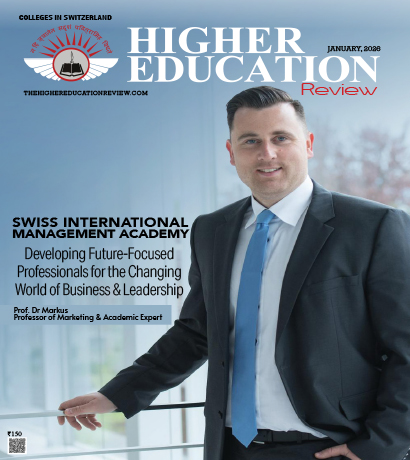International Studies And Current Gap In Training And Employability

Prof. Dr. Radhakrishna S. Aithal, Director of International Centre for Applied Sciences (ICAS) Manipal Academy of Higher Education (MAHE)
Global exposure, interaction with diverse mind-sets, work opportunities abroad, intercultural experiences; these are a few reasons cited by a few students who are aspiring to study abroad. According to ICEF monitor, only in 2018-19, more than 7,50,000 students from India went to study in various countries abroad with the USA being the most preferred destination followed by Canada and Australia. The de-mand for studying abroad has increased during the last few years. Students, across demographics, are eyeing for education abroad with each of them having their reasons or aspirations.
Karan Sagi, who is currently studying Industrial and Systems Engineering in North Carolina State University, a top tier university in the US, says he is quite keen to work for a few years in the US, hone his technical skills, learn the industry practices before he puts on his entrepreneurial hat and makes a difference in the field of industrial engineering. Dedeep, another Indian student in California, currently studying screenwriting, has an immense passion for movie making and videography. With Indian parents being more encouraging in recent times, students are exploring their interest areas and giving wings to their dreams.
Today, in India, over 30,00,000 students are aspiring to study Bachelors degree courses in top colleges. With less than 10% of them being able to get into reputed colleges of acceptable quality, there are serious concerns as to how a mere degree from an average college could meet the expectations of today’s highly competitive industry requirements. In the era of globalization, where each nation is identifying its core strength and consolidating its position in this perpetual global supply-chain of product and service delivery, education in a good university abroad could provide an invaluable impetus to all the aspiring students who aim to make a difference.
Currently the focus on skilling has taken the centerstage in employability context. There has been a push by the Government as well to improvise the skills training of the workforce and students who can have better prospects for employability. Infact the Universities have been introducing unconventional courses with the purpose of providing skills that are in demand and can prepare students for a better future. Although there is no denying that there does exist a gap between the present state and the desired goals interms of having skilled workforce.
“In the era of globalization, education in a good university abroad could provide an invaluable impetus to all the aspiring students who aim to make a difference”
Therefore, the Universities must also look at revamping curriculum, opting for research based training/learning, encouraging vocational training and design Innovative Pedagogical Tools that can link education to employment.
Growing demand for more present-day courses like Data Sciences, Artificial Intelligence, Actuarial Sciences, Experiential Management and much more, is another reason why more and more students are aspiring to experience education in countries more famous for these courses. For instance, there maybe arts students in India who would be interested in pursuing a Bachelor’s in Patisserie Technology in Paris. While some other students may be amazed by the logistics & supply-chain of modern-day e-commerce and delivery companies and would be keen to pursue studying supply-chain in Singapore/Malaysia. This shows that it is not just the industry that is constantly adapting, but also the mind-sets of the students and parents, who are today more adventurous and bold than the previous generations.
There is also a growing curiosity for transfer programs, where students can experience education in 2 different countries. Today, in India, transfer programs are available in Engineering, Medicine, Business and other courses.
The Covid-19 crisis is adversely impacting thousands of students who have made plans of studying abroad in the academic year 2019-20. It is important for these students to have a plan-B, an alternative, to ensure that they minimize the damage that is being inflicted upon them. Some students have deferred their admission to the next intake which begins usually in January/February next year. Also, there are students who are looking at alternatives like transfer programs where they can study in India for now, and then eventually go abroad and complete their degree there. Overall, it is important for students to not compromise on their aspirations and build their alternatives accordingly. This crisis shall over sooner or later but it is the aspirations that are long-term and these aspirations help the students shape their careers and lives going forward. With the outbreak of Corona around the world, the hope and dream of many aspiring students have been halted and impacted considerably. Last year, over 7.5 lakh Indian students opted to study at universities abroad with US, Canada, Australia remaining the top aspirational destinations followed by UK and Germany. For the academic year starting August-September, students should have ideally started Visa applications that have come to a grinding halt at present.
It is only fair to say that the institutes and universities globally are also fighting the same battle and they are extending their support to co-operate with the students. We have seen online video classes and assessments take the front-seat. Most of the universities have also eased up their processes of deferment and they are also in constant touch with the applicants providing them the much-needed reassurance during these times.
Karan Sagi, who is currently studying Industrial and Systems Engineering in North Carolina State University, a top tier university in the US, says he is quite keen to work for a few years in the US, hone his technical skills, learn the industry practices before he puts on his entrepreneurial hat and makes a difference in the field of industrial engineering. Dedeep, another Indian student in California, currently studying screenwriting, has an immense passion for movie making and videography. With Indian parents being more encouraging in recent times, students are exploring their interest areas and giving wings to their dreams.
Today, in India, over 30,00,000 students are aspiring to study Bachelors degree courses in top colleges. With less than 10% of them being able to get into reputed colleges of acceptable quality, there are serious concerns as to how a mere degree from an average college could meet the expectations of today’s highly competitive industry requirements. In the era of globalization, where each nation is identifying its core strength and consolidating its position in this perpetual global supply-chain of product and service delivery, education in a good university abroad could provide an invaluable impetus to all the aspiring students who aim to make a difference.
Currently the focus on skilling has taken the centerstage in employability context. There has been a push by the Government as well to improvise the skills training of the workforce and students who can have better prospects for employability. Infact the Universities have been introducing unconventional courses with the purpose of providing skills that are in demand and can prepare students for a better future. Although there is no denying that there does exist a gap between the present state and the desired goals interms of having skilled workforce.
“In the era of globalization, education in a good university abroad could provide an invaluable impetus to all the aspiring students who aim to make a difference”
Therefore, the Universities must also look at revamping curriculum, opting for research based training/learning, encouraging vocational training and design Innovative Pedagogical Tools that can link education to employment.
Growing demand for more present-day courses like Data Sciences, Artificial Intelligence, Actuarial Sciences, Experiential Management and much more, is another reason why more and more students are aspiring to experience education in countries more famous for these courses. For instance, there maybe arts students in India who would be interested in pursuing a Bachelor’s in Patisserie Technology in Paris. While some other students may be amazed by the logistics & supply-chain of modern-day e-commerce and delivery companies and would be keen to pursue studying supply-chain in Singapore/Malaysia. This shows that it is not just the industry that is constantly adapting, but also the mind-sets of the students and parents, who are today more adventurous and bold than the previous generations.
There is also a growing curiosity for transfer programs, where students can experience education in 2 different countries. Today, in India, transfer programs are available in Engineering, Medicine, Business and other courses.
The Covid-19 crisis is adversely impacting thousands of students who have made plans of studying abroad in the academic year 2019-20. It is important for these students to have a plan-B, an alternative, to ensure that they minimize the damage that is being inflicted upon them. Some students have deferred their admission to the next intake which begins usually in January/February next year. Also, there are students who are looking at alternatives like transfer programs where they can study in India for now, and then eventually go abroad and complete their degree there. Overall, it is important for students to not compromise on their aspirations and build their alternatives accordingly. This crisis shall over sooner or later but it is the aspirations that are long-term and these aspirations help the students shape their careers and lives going forward. With the outbreak of Corona around the world, the hope and dream of many aspiring students have been halted and impacted considerably. Last year, over 7.5 lakh Indian students opted to study at universities abroad with US, Canada, Australia remaining the top aspirational destinations followed by UK and Germany. For the academic year starting August-September, students should have ideally started Visa applications that have come to a grinding halt at present.
It is only fair to say that the institutes and universities globally are also fighting the same battle and they are extending their support to co-operate with the students. We have seen online video classes and assessments take the front-seat. Most of the universities have also eased up their processes of deferment and they are also in constant touch with the applicants providing them the much-needed reassurance during these times.

